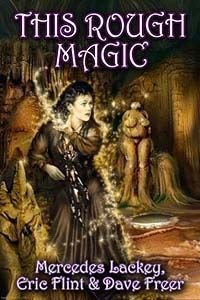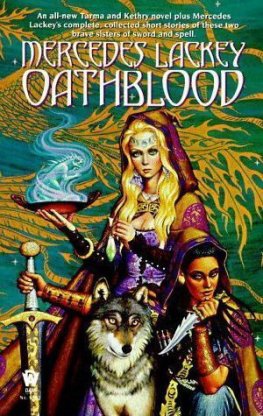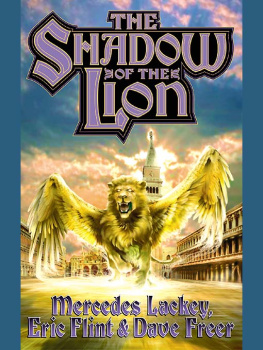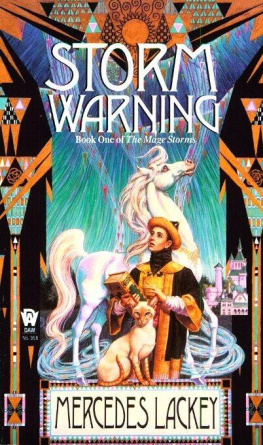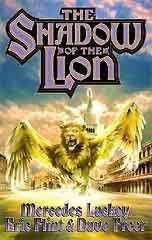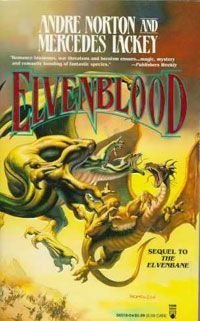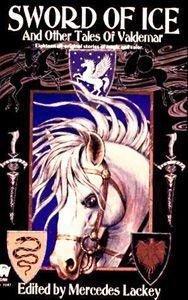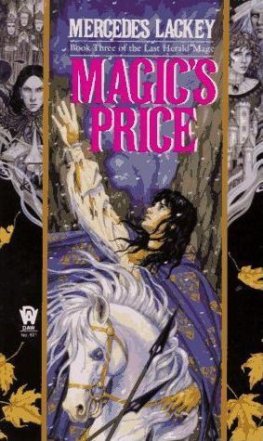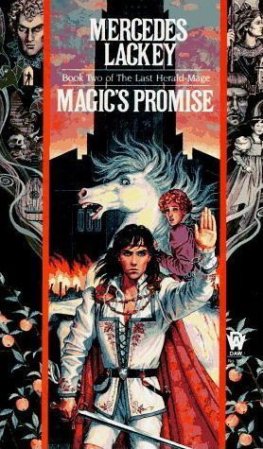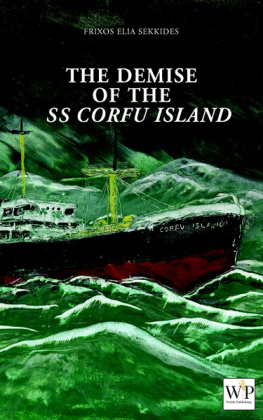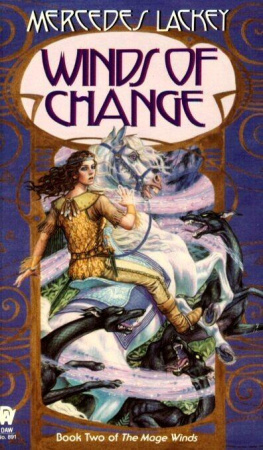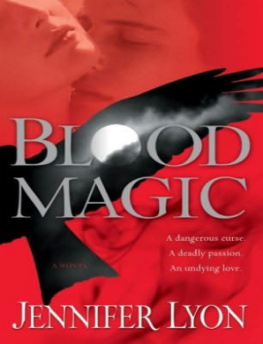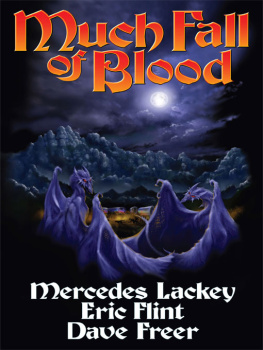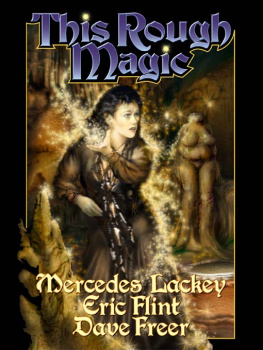This Rough MagicMercedes Lackey, Eric Flint and Dave Freer
This is a work of fiction. All the characters and events portrayed in this book are fictional, and any resemblance to real people or incidents is purely coincidental.
Copyright 2003 by Mercedes Lackey, Eric Flint and Dave Freer
All rights reserved, including the right to reproduce this book or portions thereof in any form.
A Baen Books Original
Baen Publishing Enterprises
P.O. Box 1403
Riverdale, NY 10471
www.baen.com
ISBN: 0-7434-7149-0
Cover art by Larry Dixon
First printing, December 2003
Library of Congress Cataloging-in-Publication Data
TK
Distributed by Simon and Schuster
1230 Avenue of the Americas
New York, NY 10020
Production by Windhaven Press, Auburn, NH
Printed in the United States of America
To Bishop Bartolome de las Casas (14741566 a.d.)
Prologue: Autumn, 1538 a.d.



ROME
Eneko Lopez was not the sort of man to let mere discomfort of the body come between him and his God. Or between him and the work he believed God intended him to do. The Basque ignored exhaustion and hunger. He existed on inner fires anyway, and the fires of his spirit burned hot and bright. Some of that showed in the eagle eyes looking intently at the chalice on the altar. The low-burned candles and the fact that several of the other priests had fainted from exhaustion, cold or hunger, bore mute testimony to the fact that the ceremony had gone on for many hours. Without looking away from the chalice upon which their energies were focused, Eneko could pick up the voices of his companions, still joined in prayer. There was Diego's baritone; Father Pierre's deeper bass; Francis's gravelly Frankish; the voices of a brotherhood united in faith against the darkness.
At last the wine in the chalice stirred. The surface became misty, and an image began to form. Craggy-edged, foam-fringed. A mountain . . .
The air in the chapel became scented with myrtle and lemon-blossom. Then came a sound, the wistful, ethereal notes of panpipes. There was something inhuman about that playing, although Eneko could not precisely put his finger on it. It was a melancholy tune, poignant, old; music of rocks and streams, music that seemed as old as the mountains themselves.
There was a thump. Yet another priest in the invocation circle had fallen, and the circle was broken again.
So was the vision. Eneko sighed, and began to lead the others in the dismissal of the wards.
"My knees are numb," said Father Francis, rubbing them. "The floors in Roman chapels are somehow harder than the ones in Aquitaine ever were."
"Or Venetian floors," said Pierre, shaking his head. "Only your knees numb? I think I am without blood or warmth from the chest down."
"We came close," Eneko said glumly. "I still have no idea where the vision is pointing to, though."
Father Pierre rubbed his cold hands. "You are certain this is where Chernobog is turning his attentions next?"
"Certain as can be, under the circumstances. Chernobogor some other demonic creature. Great magical forces leave such traces."
"But where is it?" asked Diego, rubbing his back wearily. "Somewhere in the Mediterranean, an island, that much is clear. Probably in the vicinity of Greece or the Balkans. But which? There are a multitude."
Eneko shrugged. "I don't know. But it is an old place, full of crude and elemental powers, a repository of great strength, and . . ."
"And what?"
"And it does not love us," Eneko said, with a kind of grim certainty.
"It did not feel evil," commented Francis. "I would have thought an ally of Chernobog must be corrupted and polluted by the blackness."
"Francis, the enemy of my enemy is not always my friend, even if we have common cause."
"We should ally, Eneko," said Francis firmly. "Or at least not waste our strength against each other. After all, we face a common enemy."
Eneko shrugged again. "Perhaps. But it is not always that simple or that wise. Well, let us talk to the Grand Metropolitan and tell him what little we know."
VILNA
Count Kazimierz Mindaug, chief adviser and counselor to Grand Duke Jagiellon of Lithuania, scratched himself. Lice were one of the smaller hazards and discomforts of his position. To be honest, he scarcely noticed them. The Grand Duke tended to make other problems pale into insignificance.
"If a direct attack on Venice is out of the question now, given our recent defeat there," he said, calmly, "then why don't we just hamstring them? We can paralyze their trade. The Mediterranean can still be ours. We can still draw the enemy into a war on a second front."
The terrible scar on Jagiellon's forehead pulsed; it looked like an ugly, purple worm half-embedded in his skin. A throbbing worm. "The Holy Roman Emperor looks for our hand in everything now, since the disaster in Venice. Charles Fredrik would ally openly with the accursed Venetians. Their combined fleets would crush our own, even in the Black Sea."
Count Mindaug nodded his head. "True. But what if our hand was not shown? What if those who at least appear to oppose us, took action against Venice and her interests?"
The Grand Duke's inhuman eyes glowed for just a moment, as the idea caught his interest. Then he shook his head. "The Emperor will still see our hand in anything."
Count Mindaug smiled, revealing filed teeth. "Of course he will. But he cannot act against his allies. He cannot be seen to be partisan, not in a matter that appears to be a mere squabble between Venice and her commercial rivals, especially when those rivals are parties with whom the Empire has either a treaty or a very uneasy relationship."
Jagiellon raised his heavy brows. "Ah. Aquitaine," he said. "I have hopes of the Norse; my plans move apace there. But it will take a little while before their fleets ravage the north. But Aquitaine, even with Genoa's assistance, cannot bottle up the Venetian fleet."
Mindaug flashed those filed teeth again. "But they could blockade the pillars of Hercules. And if the Aragonese join them, and perhaps the Barbary pirates too . . . they will easily prevent the Venetian Atlantic fleet from returning. And let us not forget that you now hold Byzantium's emperor in thrall."
Jagiellon shook his head. "It is not thralldom yet. Let us just say we know of certain vices which even the Greeks will not tolerate. We wield a certain amount of influence, yes."
"Enough to send him to attempt to regain some of his lost territory?" asked Mindaug, shrewdly.
After a moment, Jagiellon nodded. "Probably. The Golden Horn or Negroponte?"
Mindaug smiled, shark-like. "Neither, my Lord. Well, not directly. If Byzantium reduces the ability of the Venetian fleet to extract vengeance on Constantinople, and on their shipping, then the Golden Horn, Negroponte, and even Zante are theirs for the taking. Even the jewel, Crete. But while the Venetians have the freedom of the Mediterranean, Alexius dares not seize Venetian property. And one island is the key to the Adriatic. To bottling the Venetians into a little corner. Corfu. The Byzantines attack and capture Corfu in alliance with Emeric of Hungary. Corfu is the key to the Adriatic. With it captured . . . Venice's traders die."
Next page 
